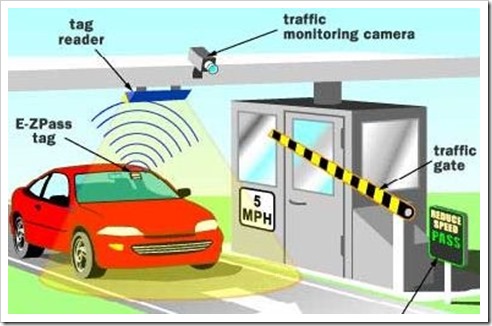All National Highways to get RFID Electronic Toll Collection by March 2014
If you frequently travel on National Highways, you are sure to come across long lines at Toll Collection booths. It slows down the journey tremendously in addition to creating traffic snarls. But this could soon be thing of past.
According to the statement made by Union Minister for Road Transport and Highways (MoRTH), Dr. C.P Joshi – All the toll plazas on Indian National Highways will implement RFID based Electronic Toll Collection system by March 31, 2014.
If you are unaware of Electronic Toll Collection or ETC, it is a system where toll payments happen electronically without the traveler stopping at the Toll collection booth. The vehicle is equipped with RFID based electronic Tags and toll booths are equipped with electronic sensors that wirelessly scan and uniquely identify each vehicle passing through.
You can check out the sample image below which gives you a rough idea on how Electronic Toll Booth works.

Talks of ETC implementation have been doing rounds for past few years, however, there had been no concrete announcement from the Government till now. With statement made by Union Minister, it looks like the implementation will start soon.
How ETC may work in India
In 2010, Government had setup a committee headed by Mr. Nandan Nilekani to see the feasibility of ETC in India. Last year, a successful pilot project was also carried out at Parwanoo on NH-5. Once ETC is implemented, this is how it will probably work.
Every car will be given a RFID tag (with information car details, account number etc) which will be stuck on the windscreen of the car, while the Toll booth will have a RFID card reader. When any vehicle with RFID tag passes through this booth across the country, the appropriate toll will be debited from the account.
The RFID tag will work similar to mobile prepaid card – where the vehicle owner will have to recharge the card. Alternatively, the RFID tag may also have bank account details and once the vehicle passes through the toll booth, the toll may then get directly debited to connected bank account.

I saw such system working in Singapore.
But in India, the system will not work.
For it to work, the following must happen :
As the article says, every vehicle must be equipped with RFID Tags. How to implement this? Govt will come up with a notice to all vehicle owners to get the tag before so and so date. Few will do and lots will ignore it. People will see there is benefit in ignorance. No RFID Tag, no toll !!
Govt tells all auto manufacturers to include the Tag before the car leaves factory. OK New cars will have tags, what about old cars?
The best way is to show people the benifit of having such tag. At every toll, make a seperate lane for vehicles with such tags. Let those waiting in the long lines see how vehicles with tags pass smoothly.
People will go after tags. Govt dont have to run after people.
Just my two paisa :)
@altaf… you should not be so pessimistic about it… I guess you may be able to pick up tags for your journey exactly like you get that PUC sticker attached to your car. Yes, I agree they will have to make sure that these RFID tags are accessible and simple to get. Also, going without toll will not be possible… because the toll stopper will not allow you to go further if you do not have an RFID tag… now these are all ifs and buts… but I am sure if you and I can understand this, Govt. may have definitely take care of this..
Let us give it time for implementation… Just my thoughts…
Like I always do, I like to look at the positive side of things.. I am an optimist
Vehicles with RFID Tag will pass through a dedicated lane where the toll stopper senses RFID tag of the vehicle and automatically open. So the queue will be short or non-existent in these lanes. However vehicles without RFID tag will have to pass through ‘Cash’ lanes like we do now and that means there will be build up and long lanes there. This waiting time in itself will work as motivation for motorists to go and procure RFID tag to save their journey time.